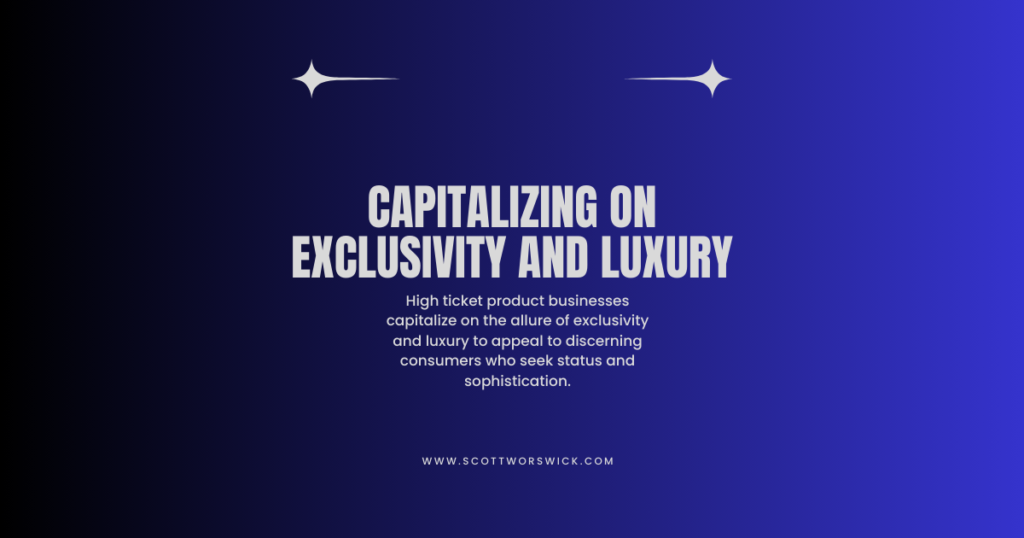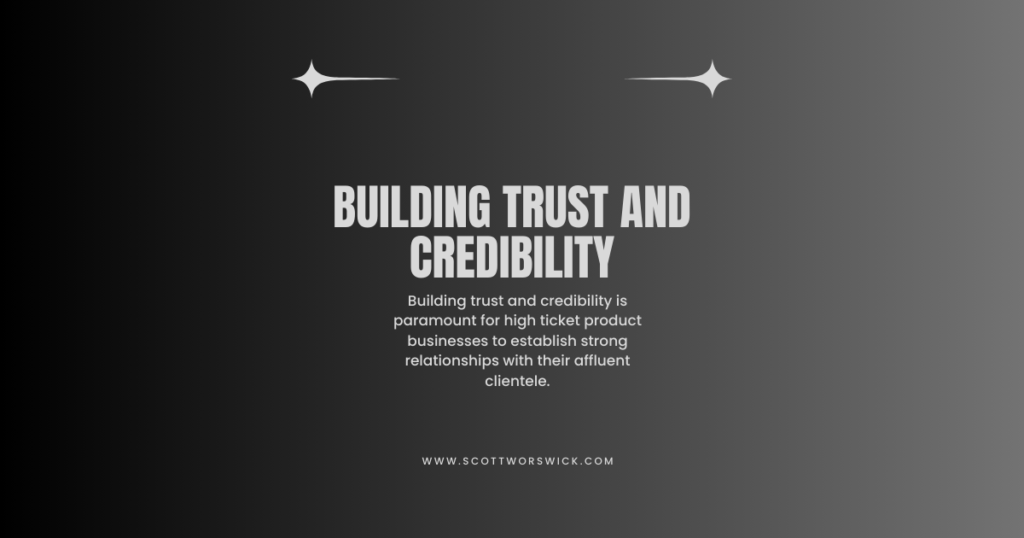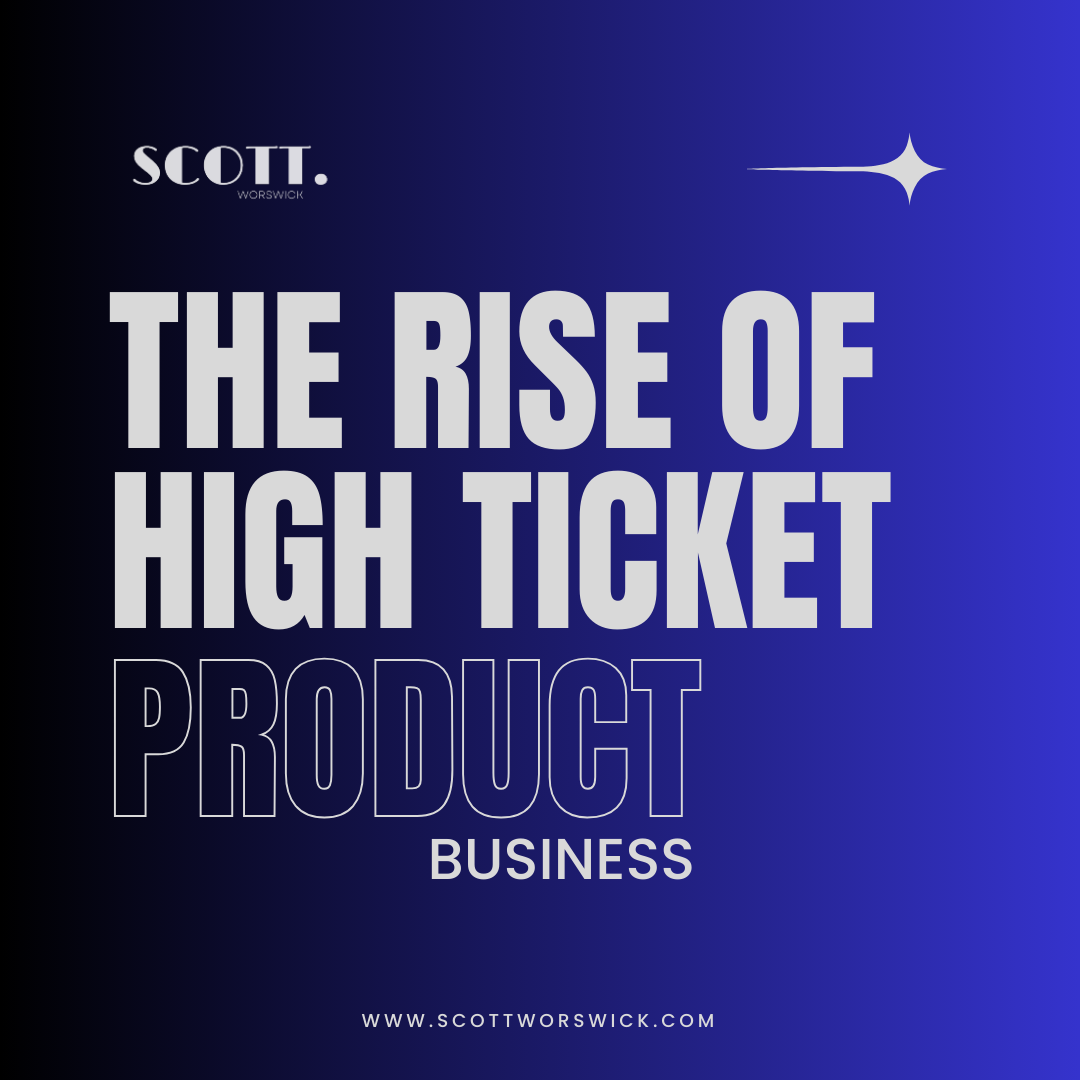In recent years, a profound transformation has been witnessed in the entrepreneurial landscape, characterized by the ascendancy of high ticket product business models. These models, predicated on selling premium-priced goods or services, have garnered remarkable traction among ambitious entrepreneurs seeking lucrative opportunities. The allure of high ticket products lies in their capacity to yield substantial returns on investment, presenting an attractive proposition for those eager to establish successful ventures. Whether it’s luxury watches, bespoke furniture, or exclusive travel experiences, high ticket products cater to a discerning clientele willing to invest significantly in items that epitomize quality, sophistication, and exclusivity.
The burgeoning popularity of high ticket product businesses can be attributed to shifting consumer preferences and an increasing demand for premium offerings. Affluent consumers, driven by a desire for luxury and exclusivity, are drawn to products that promise superior quality, craftsmanship, and status. In an era where conspicuous consumption is prevalent, high ticket products serve as symbols of affluence and success, appealing to individuals who seek to elevate their lifestyle and distinguish themselves from the masses. This burgeoning demand has created a fertile market for entrepreneurs looking to capitalize on the allure of high ticket products and cater to the evolving needs and aspirations of affluent consumers.
Furthermore, the advent of digital technology has revolutionized the way high ticket products are marketed, sold, and distributed. E-commerce platforms, social media channels, and online marketplaces have democratized access to global markets, enabling entrepreneurs to reach a vast audience of affluent consumers with unprecedented ease and efficiency. Through targeted advertising, personalized messaging, and immersive brand experiences, high ticket product businesses can engage with potential customers on a global scale and showcase the unique value proposition of their offerings. This digital revolution has leveled the playing field for entrepreneurs, empowering them to compete with established brands and carve out a niche in the lucrative market for high ticket products.
Table of Contents
1. Evolving Consumer Preferences and Demand
The landscape of consumer preferences and demands has undergone a profound evolution, fueling the rise of high ticket product businesses. Today’s consumers, particularly those with significant disposable income, seek more than just functionality; they crave products that embody status, luxury, and exclusivity. This shift in mindset has led to a growing appetite for high ticket products across various industries, from luxury automobiles to designer fashion and upscale experiences. Affluent consumers are increasingly willing to invest in items that offer exceptional quality, craftsmanship, and prestige, elevating their lifestyle and reflecting their discerning tastes.
Moreover, the digital age has played a pivotal role in shaping consumer behavior and fueling the demand for high ticket products. With the advent of social media, online influencers, and digital marketing, consumers are exposed to a myriad of aspirational lifestyles and luxury goods on a daily basis. This heightened exposure has contributed to a culture of conspicuous consumption, where individuals aspire to own high ticket products as symbols of success and status. Additionally, the convenience and accessibility of online shopping have made it easier than ever for consumers to indulge in their desires and splurge on premium-priced items that resonate with their aspirations.
Furthermore, the concept of experiential consumption has emerged as a driving force behind the demand for high ticket products. In today’s experience-driven economy, consumers prioritize memorable experiences over material possessions, seeking out unique and exclusive opportunities to create lasting memories. High ticket products, whether it’s a luxury vacation package, VIP event tickets, or personalized concierge services, offer consumers the chance to indulge in extraordinary experiences that money can’t buy. By tapping into this desire for experiential luxury, high ticket product businesses can captivate consumers and cultivate brand loyalty in an increasingly competitive market.
2. Capitalizing on Exclusivity and Luxury

High ticket product businesses capitalize on the allure of exclusivity and luxury to appeal to discerning consumers who seek status and sophistication. By offering limited edition items, bespoke services, and VIP experiences, these businesses create a sense of exclusivity and prestige that resonates with their target audience. Affluent consumers are drawn to high ticket products not only for their intrinsic value but also for the status and social recognition they confer. Whether it’s a designer handbag, a luxury watch, or a high-end automobile, these products serve as tangible symbols of wealth and success, elevating the owner’s social standing and enhancing their self-image.
Moreover, high ticket product businesses leverage the psychology of luxury to evoke desire and aspiration among consumers. Luxury is often associated with rarity, craftsmanship, and heritage, imbuing high ticket products with an intangible allure that transcends their functional utility. By positioning their offerings as aspirational lifestyle choices rather than mere commodities, businesses can tap into consumers’ desire for self-expression and identity enhancement. Through strategic branding, storytelling, and experiential marketing, high ticket product businesses create an emotional connection with their target audience, fostering a sense of belonging and exclusivity that drives purchase intent.
Furthermore, the exclusivity of high ticket products extends beyond their price tag to encompass the entire customer experience. From personalized consultations and VIP events to concierge services and white-glove delivery, high ticket product businesses prioritize premium service and attention to detail at every touchpoint. By delivering exceptional customer experiences that exceed expectations, these businesses reinforce their brand image as purveyors of luxury and sophistication. In doing so, they not only attract affluent consumers but also cultivate long-term loyalty and advocacy, ensuring sustained success in a competitive market landscape.
3. Leveraging Digital Platforms for Global Reach of High Ticket Products
In today’s interconnected world, high ticket product businesses are leveraging digital platforms to expand their reach and connect with affluent consumers on a global scale. E-commerce platforms, social media channels, and digital marketing strategies have become indispensable tools for reaching potential customers and showcasing the unique value proposition of high ticket products. By harnessing the power of digital platforms, businesses can transcend geographical boundaries and tap into new markets, unlocking untapped revenue streams and driving growth opportunities.
One of the key advantages of leveraging digital platforms for high ticket product businesses is the ability to target specific demographics and tailor marketing efforts to reach high-value consumers. Through data analytics and audience segmentation, businesses can identify and engage with affluent individuals who are most likely to be interested in their offerings. By crafting personalized messaging and curated content that speaks to the desires and aspirations of their target audience, high ticket product businesses can capture attention, build brand awareness, and drive qualified leads to their online storefronts.
Moreover, digital platforms offer high ticket product businesses unprecedented access to valuable consumer insights and market intelligence. By tracking customer interactions, analyzing purchasing behavior, and monitoring industry trends, businesses can gain valuable insights into consumer preferences, competitive dynamics, and emerging opportunities. This data-driven approach enables businesses to refine their product offerings, optimize marketing strategies, and stay ahead of the curve in a rapidly evolving marketplace. By leveraging digital platforms for global reach, high ticket product businesses can position themselves for success in an increasingly competitive and interconnected world.
4. Building Trust and Credibility

Building trust and credibility is paramount for high ticket product businesses to establish strong relationships with their affluent clientele. Given the significant investment associated with purchasing high ticket items, consumers expect transparency, reliability, and exceptional customer service from the brands they choose to engage with. High ticket product businesses must prioritize integrity and authenticity in all their interactions, from product descriptions and pricing to post-purchase support. By delivering on promises and consistently exceeding expectations, businesses can earn the trust and loyalty of their customers, fostering long-term relationships that drive repeat purchases and positive word-of-mouth referrals.
One effective strategy for building trust and credibility in the high ticket product market is to provide extensive product information and education to potential customers. Affluent consumers are often discerning and research-oriented, seeking detailed insights into the features, benefits, and value proposition of high ticket items before making a purchase decision. High ticket product businesses can leverage digital platforms to create informative content, such as product demonstrations, user reviews, and expert testimonials, that helps educate and empower consumers to make informed choices. By positioning themselves as authoritative sources of information and expertise, businesses can instill confidence in their offerings and differentiate themselves from competitors in the market.
Furthermore, fostering open and transparent communication channels is essential for high ticket product businesses to address customer inquiries, concerns, and feedback effectively. Whether through live chat support, email correspondence, or social media engagement, businesses must be readily accessible and responsive to customer queries. Timely and personalized communication not only enhances the customer experience but also demonstrates a commitment to customer satisfaction and service excellence. By proactively addressing customer needs and resolving issues in a timely manner, high ticket product businesses can strengthen trust and credibility, reinforcing their reputation as trusted purveyors of quality and luxury goods.
5. Maximizing Profit Margins and Returns on Investment
Maximizing profit margins and returns on investment is a fundamental objective for high ticket product businesses seeking sustainable growth and success. Unlike businesses focused on high-volume sales, high ticket product businesses prioritize selling fewer items at premium prices to achieve substantial profitability. This strategy allows them to capitalize on the inherent value and exclusivity of their offerings, commanding premium prices that yield attractive profit margins. By meticulously managing costs, optimizing pricing strategies, and maximizing operational efficiency, high ticket product businesses can achieve healthy profit margins that support long-term growth and financial stability.
One key advantage of high ticket product businesses is their ability to achieve higher returns on investment compared to businesses selling lower-priced items. While the initial investment may be significant, the potential for profitability is also considerably greater. By focusing on selling premium-priced items with substantial profit margins, entrepreneurs can recoup their investment more quickly and generate significant returns over time. Moreover, high ticket product businesses benefit from economies of scale, as the cost of acquiring customers and fulfilling orders remains relatively constant regardless of the price of the product sold.
Furthermore, high ticket product businesses can enhance their profitability by implementing strategic pricing strategies and value-added services. Value-based pricing, tiered pricing, and bundling are common techniques used to maximize revenue and profitability while maintaining competitive positioning in the market. Additionally, offering complementary services such as customization, personalization, and after-sales support can further differentiate high ticket products and justify premium prices. By continuously innovating and refining their offerings to deliver exceptional value to customers, high ticket product businesses can maximize profit margins and achieve sustainable returns on investment in the long run.
6. Creating Compelling Value Propositions
Creating compelling value propositions is essential for high ticket product businesses to effectively communicate the unique benefits and value they offer to their affluent clientele. A strong value proposition serves as the foundation of a brand’s messaging and positioning in the market, articulating why customers should choose their high ticket products over competitors. High ticket product businesses must identify and highlight the key features, advantages, and benefits of their offerings that resonate with their target audience’s desires and aspirations. By clearly communicating the value proposition, businesses can capture the attention of affluent consumers and differentiate themselves in a crowded marketplace.
One key aspect of creating a compelling value proposition for high ticket product businesses is emphasizing the superior quality, craftsmanship, and exclusivity of their offerings. Affluent consumers are discerning and expect nothing but the best when investing in high ticket items. High ticket product businesses must emphasize the attention to detail, precision engineering, and exceptional materials that set their products apart from mass-market alternatives. By positioning their offerings as symbols of luxury, sophistication, and status, businesses can appeal to affluent consumers who seek products that reflect their refined tastes and discerning lifestyles.
Moreover, high ticket product businesses can enhance their value proposition by highlighting the unique experiences, personalized services, and lifestyle benefits associated with their offerings. Whether it’s access to exclusive events, personalized concierge services, or VIP treatment, high ticket products offer more than just functional utility; they provide consumers with opportunities to indulge in luxury and elevate their everyday experiences. By emphasizing the experiential aspect of their offerings, businesses can appeal to consumers’ emotions and aspirations, fostering a deeper connection and sense of affinity with their brand.
7. Embracing Innovation and Differentiation
Embracing innovation and differentiation is crucial for high ticket product businesses to stay ahead of the curve and maintain a competitive edge in the market. In an increasingly crowded marketplace, where consumers are inundated with options, businesses must continually innovate their products, services, and marketing strategies to stand out from the competition. High ticket product businesses can differentiate themselves by introducing innovative features, pioneering new technologies, and reimagining traditional concepts to create unique value propositions that resonate with their target audience’s desires and aspirations.
One effective strategy for high ticket product businesses to embrace innovation is by leveraging cutting-edge technologies to enhance their offerings and improve the customer experience. Whether it’s incorporating artificial intelligence, augmented reality, or blockchain technology, businesses can use technology to create immersive and interactive experiences that engage and delight their customers. By staying abreast of technological advancements and embracing innovation, high ticket product businesses can differentiate themselves from competitors and capture the attention of tech-savvy consumers who seek innovative solutions and cutting-edge products.
Furthermore, high ticket product businesses can differentiate themselves by focusing on sustainability, ethical practices, and social responsibility. As consumers become increasingly conscious of the environmental and social impact of their purchasing decisions, businesses that prioritize sustainability and ethical sourcing can gain a competitive advantage. Whether it’s using eco-friendly materials, supporting fair labor practices, or giving back to the community, high ticket product businesses can appeal to socially conscious consumers who value ethical and responsible brands. By integrating sustainability into their business practices and communicating their commitment to social responsibility, businesses can differentiate themselves in the market and attract consumers who align with their values and beliefs.
Moreover, high ticket product businesses can differentiate themselves by offering personalized and customizable solutions that cater to the unique needs and preferences of their affluent clientele. Whether it’s bespoke tailoring, personalized engraving, or custom-made designs, businesses can empower customers to create one-of-a-kind products that reflect their individual style and personality. By offering personalized experiences and tailored solutions, high ticket product businesses can foster deeper connections with their customers and create a sense of exclusivity and intimacy that sets them apart from mass-market alternatives.
8. Scaling for Growth and Sustainability
Scaling for growth and sustainability is a pivotal aspect of high ticket product businesses’ long-term success in the market. While high ticket products often command premium prices and offer attractive profit margins, businesses must also focus on scalability to capitalize on market opportunities and achieve sustainable growth. Scaling requires careful planning, strategic investments, and efficient resource allocation to expand operations, penetrate new markets, and meet growing demand without compromising product quality or customer satisfaction.
One key consideration for high ticket product businesses when scaling is to optimize their supply chain and production processes to accommodate increased demand. As sales volumes grow and customer expectations rise, businesses must streamline their operations, improve efficiency, and minimize bottlenecks to ensure timely delivery and fulfillment of orders. This may involve investing in automation, implementing lean manufacturing principles, or forging strategic partnerships with suppliers and distributors to enhance agility and responsiveness in meeting market demand.
Moreover, high ticket product businesses can scale effectively by diversifying their product offerings and expanding their market reach. By introducing new product lines, extending product ranges, or entering new market segments, businesses can tap into additional revenue streams and mitigate risks associated with relying solely on a single product or market. However, it’s essential to maintain consistency in brand messaging, product quality, and customer experience across all offerings to preserve brand integrity and reputation while scaling. By diversifying their product portfolio and expanding into new markets, high ticket product businesses can unlock untapped growth potential and achieve sustainable expansion in the long run.
9. Navigating Market Dynamics and Challenges
Navigating market dynamics and challenges is an integral aspect of the journey for high ticket product businesses seeking to maintain relevance and competitiveness. The market for high ticket products is subject to various forces, including changing consumer preferences, economic fluctuations, and technological advancements. High ticket product businesses must stay attuned to these dynamics and adapt their strategies accordingly to capitalize on emerging opportunities and mitigate potential risks.
One of the key challenges high ticket product businesses face is the need to stay abreast of shifting consumer preferences and market trends. Consumer tastes and preferences are constantly evolving, influenced by factors such as cultural shifts, technological advancements, and socio-economic changes. High ticket product businesses must conduct regular market research, analyze consumer behavior, and monitor industry trends to anticipate shifts in demand and stay ahead of the curve. By remaining agile and responsive to changing market dynamics, businesses can adjust their product offerings, marketing strategies, and pricing models to align with evolving consumer preferences and maintain their competitive edge.
Moreover, high ticket product businesses must navigate competitive pressures and differentiate themselves from rivals in the market. With an increasing number of players vying for affluent consumers’ attention, businesses must find ways to stand out and carve out a unique position in the market. This may involve developing innovative products, delivering exceptional customer experiences, or leveraging branding and marketing strategies to create a distinct identity and build brand equity. By focusing on their unique value proposition and effectively communicating their brand story, high ticket product businesses can differentiate themselves from competitors and capture market share in a crowded marketplace.
Conclusion
In conclusion, the rise of high ticket product business models presents a wealth of entrepreneurial opportunities in today’s marketplace. As consumer preferences continue to evolve, driven by a desire for luxury, exclusivity, and exceptional quality, high ticket products have gained prominence as symbols of status and sophistication. Entrepreneurs looking to capitalize on this trend can leverage digital platforms, innovation, and strategic differentiation to establish successful ventures that cater to affluent consumers’ discerning tastes and aspirations.
The appeal of high ticket products lies not only in their premium pricing but also in the value, prestige, and lifestyle benefits they offer to consumers. By delivering superior quality, craftsmanship, and personalized experiences, high ticket product businesses can foster long-term relationships with their clientele and cultivate brand loyalty that transcends individual transactions. Moreover, by scaling effectively, diversifying their product offerings, and navigating market dynamics, high ticket product businesses can achieve sustainable growth and longevity in a competitive marketplace.
As the global economy continues to evolve, high ticket product businesses are well-positioned to thrive and redefine the future of commerce. By embracing innovation, adapting to changing consumer preferences, and delivering exceptional value, these businesses can unlock untapped growth potential and shape the trajectory of their industries. In doing so, they can create lasting impact, drive economic prosperity, and enrich the lives of consumers by offering products and experiences that elevate their lifestyle and fulfill their aspirations.




